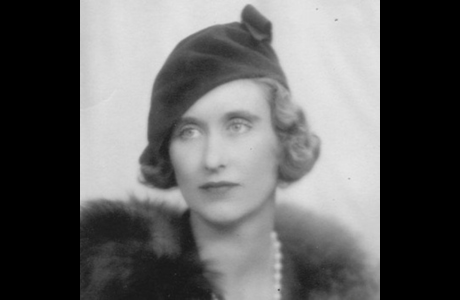
Iris Cutting Origo was an upper-class British writer living in Italy who transformed her lavish estate into a safe haven for refugees during World War II.
Iris Cutting was born in England in 1902 to a privileged family. Her father was an American diplomat and her mother was a British aristocrat. The family moved frequently when Iris was little in search of an effective treatment for her father’s tuberculosis. He died when she was 7, and Iris and her mother moved to a fifteenth-century villa in Florence, Italy. Her father’s death and her nomadic childhood made Iris feel like she didn’t belong anywhere, and she developed a strong sense of compassion for outsiders.
During the First World War, teenage Iris started a clothing drive and persuaded her mother to take in a homeless family. After the war, Iris married Antonio Origo, a dashing cavalry veteran ten years her senior. In the 1920’s, they purchased La Foce, a large estate in Tuscany. The tenant farmers on the estate were mostly poor, illiterate, malnourished and unhealthy. The Origos renovated the tenants’ homes and provided them with nutritious food, schools for adults and children, and state-of-the-art health-care facilities.
In 1925, Iris gave birth to their first child, Gianni. When he was seven – the same age Iris was when she lost her father – Gianni died of meningitis. Iris plunged into a severe depression. After several months, she channeled her energy into writing, and published several popular biographies of Italian cultural figures.
After World War II began in 1939, Iris began volunteering with the Red Cross in Rome, and gave birth to two daughters. After the Germans occupied Italy in 1943, she turned her beloved La Foce into a safe haven for escaped Allied POWs, Jewish refugees from Rome and Florence, Italian army deserters, and resistance fighters. She fed them, clothed them, cared for them and provided shelter in her luxurious compound.
In 1944, after the Allies had landed in Southern Italy, the front lines came very close to the Origo estate. On June 2, German soldiers occupied La Foce, and Iris and Antonio sprang into action. They led a large group, including 23 Jewish refugee children, an orphan baby, most of the La Foce tenant families, and their own infant daughters, to safety in sleepy mountain towns, where she found temporary shelters for the refugees.
As soon the Germans left La Foce, Iris and Antonio returned to find their beautiful home nearly destroyed. Their belongings had been looted, their livestock stolen or killed, and the tenants who’d chosen to remain had been raped or murdered. The Origos worked to make La Foce habitable again, and brought the refugee children back there, where Iris cared for them for the rest of the war. After World War II ended, Iris reunited most of the children with their families, and found adoptive homes for the rest.
For the rest of her life, Iris continued her tireless work on behalf of the poor, the oppressed, and the homeless. She published children’s books and several more biographies. After Antonio’s death in 1976, Iris’ mental and physical health began to decline. She died at La Foce in 1988, at age 85. The epitaph on her gravestone reads, “The more you know, the more you love, and by loving more, the more you enjoy.”
For opening her home and her heart to refugees from Fascist oppression, we honor Iris Origo as this week’s Thursday Hero.
Get the best of Accidental Talmudist in your inbox: sign up for our monthly newsletter.